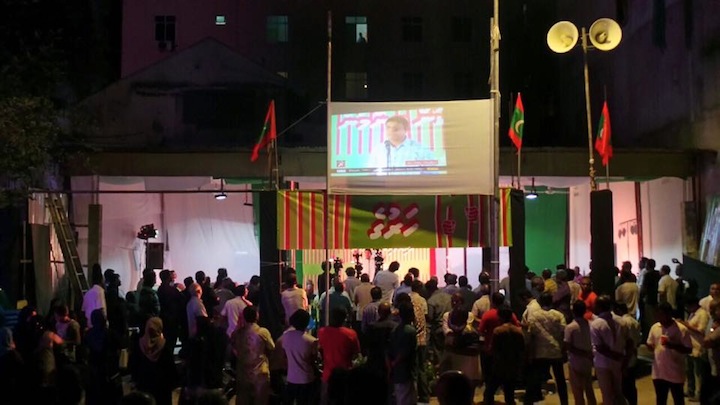The opposition alliance says its new haruge (meeting hall) opened in Malé last night will give renewed impetus to the ‘Maldivians against tyranny’ campaign.
Addressing opposition supporters gathered for the opening, Jumhooree Party (JP) deputy leader Ameen Ibrahim said the opposition resume its activities with more passion and resolve with the meeting hall.
The “song and melody” of the opposition alliance has not changed, Ameen said, and the parties were united through a common purpose.
Ameen said forthcoming talks between the government and opposition could be fruitful if President Abdulla Yameen’s invitation for dialogue is sincere.
The opposition parties will accept the invitation in the interest of peace and for the sake of detained opposition leaders and supporters, he said.
While the three opposition parties will respond separately to the official invitations, Ameen said the “agenda” and stance of the allied parties are the same.
President Yameen’s proposed agenda focuses on three aspects; political reconciliation, strengthening the judiciary and legal system and political party participation in economic and social development.
President’s office spokesperson Ibrahim Muaz Ali, however, ruled out negotiations over the imprisonment of ex-president Mohamed Nasheed and ex-defence minister Mohamed Nazim.
The pair’s arrest in February and subsequent imprisonment triggered the ongoing political crisis. The opposition alliance has staged mass demonstrations on February 27 and May 1 calling for their release.
Some 30 protesters arrested from the May Day anti-government demonstration meanwhile cut ribbons at last night’s opening ceremony. The meeting hall is located in front of the artificial beach stage.
A donation box has also been placed at the meeting hall to raise funds for the opposition cause.
The wives of detained main opposition Maldivian Democratic Party (MDP) chairperson Ali Waheed and Adhaalath Party president Sheikh Imran Abdulla also attended last night’s rally.
The opposition leaders were arrested in the wake of the May Day protest and accused of inciting violence against the government.
Ameen said the pair were being held in solitary confinement in small cells at the Dhoonidhoo detention centre. Ali Waheed was suffering back pains because his concrete bunk was too small for his size, Ameen said.
The former transport minister called on the president to cease the government’s alleged efforts to foster “a culture of brutality,” warning that President Yameen could be remembered as the “most brutal ruler” in the country’s history.
MDP vice president Mohamed Shifaz said the opposition alliance will continue its activities until imprisoned politicians are released.
Adhaalath Party council member Shidhatha Shareef questioned the sincerity of President Yameen’s call for talks as he had not accepted the opposition’s repeated appeals during the past three months.
“President Yameen is not part of the delegation he assigned after calls for talks. We are calling for talks to resolve the serious political turmoil in the country. If the president of the Maldives does not have the capability to do it, I don’t believe he has the capability to be the president,” she said.
The president’s office sent official invitations to the three opposition parties yesterday. So far, only the JP has officially accepted the invitation and assigned representatives for the talks.



